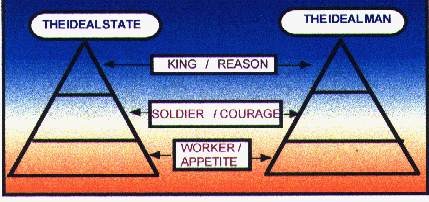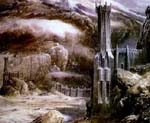- These lines have been offered as an archetypical tour into the subconsciousness of the Anglo-Saxon. How do they fit the present journey? Tolkien noted of course, in the Monsters and Critics Essay that the tragedy of an Anglo-Saxon warrior was to live when he did. With what is that juxtaposed here, and what allusion sustains the interpretation?
L. As the chapter concludes, how is Aragorn validated?
CHAPTER III: THE MUSTER OF ROHAN
A. Fragmentation of the fellowship always seems to suggest loss of hope, as Eomer suggests when learning Aragorn has gone to the paths of the dead, but...?
B. Look at Merry's little summary:
The Paths of the Dead. What does all this mean?
They have all left me now. They have all gone to
some doom: Gandalf and Pippin to war in the East;
and Sam and Frodo to Mordor; and Strider and
Legolas and Gimli to the Paths of the dead. But my
turn will come soon enough, I suppose. I wonder what
they are all talking about...?
C. Who does know? Note again Tolkien on history and legends...The mention of Baldor, son of Brego serves to validate what? Ascertaining the chapter's tone is important as is prophecy once again: "The way is shut...until the time comes." (For whom?)
D. Hirgon's plea suggests that for Tolkien, history potentially repeats itself: link to the episode, the Mirror chapter from Volume II. Why? Now, Theoden promises help to Denethor?
E. The 'arming of the hero' is obviously an important epic device. Who is armed here? Any irony?
F. Who is Dernhelm?
G. Does this chapter suggest much hope?
CHAPTER IV: THE SIEGE OF GONDOR
A. Chapter IV dramatize hope and despair via the actions of Gandalf and Denethor whose actions continue to reflect Tolkien's moral philosophy; how do hope and despair?
B. Contrast Merry's summary in the previous chapter with Pippin's in this one.
C. To what is Denethor compared and why?
D. Notice how Tolkien interlaces the despair in this chapter with Frodo: the reference is to JOURNEY TO THE CROSSROADS, and biblically to Jesus' comment about the lilies of the field and the bird in the air. Explore the connection: what is Pippin thinking?
E. Gandalf, "...always turns up when things are darkest." What does that mean?
F. The Faramir-Denethor meeting has an important moral point. Pippin, perhaps not fully aware of the import of his words, sets the tone Tolkien intends. What angers Denethor about Faramir's contact with Frodo. He is intelligent enough to piece together fragments, but is he wise ... "He would have brought me a mighty gift," laments Denethor about Boromir, and he continues to: "...send it in the hands of a witless halfling into the hands of the Enemy...is madness."
G. What is really the (moral) madness, a madness that becomes significantly more demonstrable when evaluated by Gandalf.
I. Ironically, as Gandalf tells Pippin there was never much hope to achieve; yet out of that very context emerges what will make victory possible. What does Tolkien believe?
J. Interestingly, Gandalf knows what Aragorn has done, and also (in biblical fashion), prophecies the doom of the Lord of the Nazgul: "not by the hand of man shall he fall..."
L. Of course the battle does not go well. Henry James noted that beauty is enchanting but rare, and evil is insolent and strong. Minas Tirith is on the verge of collapse, the Pelennor abandoned, Faramir wounded, and Denethor....Well, Pippin notices a change. What has happened, and why--we need to look for an answer that transcends the tide of battle; what morally happens?
M. What is the 'sin' of Denethor, the only sin that God 'cannot' forgive? Trace its origins. Should we be surprised. The Monsters and Critics Essay will help. Is Tolkien dramatizing an Anglo-Saxon's potentially fatal flaw. One critic calls Denethor a coward. Is he?... Mad?
N. One of Pippin's "finest hours" happens here. How does he behave, and how has his growth made his actions possible? Could we have anticipated these events earlier?
O. Concluding horrors and hope:
- what is Grond, and what does it do?
- the entry of The Lord of the Nazgul
- Gandalf and several biblical allusions
- macrocosmic / microcosmic imagery.
P. There is in this chapter and The Pyre of Denethor, an important interlace that foreshadows how Tolkien will validate Aragorn's kingship in The Steward and the King. The episode concerns a conversation between Beregond and Pippin regarding Faramir. There appears to be a conflict between Tolkien's Catholic and Anglo-Saxon beliefs.
CHAPTER V: THE RIDE OF THE ROHIRRIM
A. How does this chapter offer hope?
B. Characterize Merry's maturity in the beginning of the chapter; what gives him such remarkable courage?
C. Who is Dernhelm?
D. Study Tolkien's style as they approach Minas Tirith. How do the epic-like motifs bring hope from despair. Do you find the actions of Theoden credible and consistent?
CHAPTER VI: THE BATTLE OF THE PELENNOR FIELDS

A. As with Helm's Deep, Tolkien stages another magnificent battle scene, as the films make clear.
B. Catholic and Anglo-Saxon and Romantic and feminist themes converge as a terrifying enemy perishes, slain by the unlikeliest of heroes.
C. What does the first paragraph of the chapter mean thematically?
D. Do you see a Macbeth allusion [Act I] in the charge of Theoden?
E. Macbeth and Beowulf allusions continue to predominate both in terms of role reversal and moral issues such as equivocation. Who helps to save Theoden? What would a feminist say? The price for victory, though, is quite high.
F. In addition to the Beowulf allusions regarding the death of the Nazgul King, there is another less obvious reference to THE BATTLE OF MALDON, which has a line that for Tolkien summed the meaning of Anglo - Saxon culture, and the kind of heroism herein actualized by Eowyn and Merry: Maldon is a fragment., with the beginning and ending lost. In the late 10th century, Danish raids on the English coast were frequent. This poem describes how the Saxons under Bryhtnoth met the Danes under Anlaf, the Viking cyn. The Vikings demanded tribute, and the English quickly refused so battle was joined. The English were winning because the Danes were pinned down on a narrow strip of land linking an island to the battlefield . Seeing this, the Danes asked if they could be allowed to cross it unattacked so the fight would be fair :
When the hated strangers saw and understood
what bitter bridge warders were brought against them there,
they began to plead with craft , craving leave
to fare over the ford and lead across their footman.
The following is Bryhtnoth’s response:
Then the Eorl; was overswayed by his heart’s arrogance
to allow overmuch land to that loath nation:
the men stood silent and Brighthelm’s son
called out over the cold water.
The ground is cleared for you: come quickly to us,
gather to battle . God alone knows
who shall carry the wielding of this waste ground.
As soon as the Danes cross, the battle continues, and the English are slaughtered. In the battle, Bryhtnoth is killed. The fragment concludes with Byrhtwold’s battle cry to the losing English. This has been called by Tolkien the finest example of the Anglo-Saxon comitatus code.
Courage shall grow keener, clearer the will,
the heart fiercer,as our force faileth
Here our lord lies, leveled in the dust,
The man all marred:: he shall mourn to the end
who thinks to wend off from this war-play now.
Though I am white with winters, I will not away,
For I think to lodge me alongside my dear one,
lay me down by my lord's right hand.
For Tolkien, such embodies the spirit of Beowulf and Pelennor Fields, so much so that he wrote a sequel, called THE HOMECOMING OF BEORHTNOTH, BEORHTHELM'S SON, a play in which a scop's son's perspective contrasts with the veterans of combat:
Torhthelm: Realms here they won and royal kingdoms,
and in olden days this isle conquered.
And now from the North need comes again:
wild blows the wind of war to Britain.
Tidwald: And in the neck we catch it, are nipped as
chill as poor men were then. Let the poets
babble, but perish all pirates. When the poor
are sobbed and lose the land they love and
toiled on, they must die and dung it. No dirge
for them, and their wives and children
work in serfdom...
Torhthelm: ...Heart shall be bolder, harder be
purpose, more proud the spirit as our power
lessens. Mind shall not falter...
His chant is interrupted when the cart they are driving to remove the dead hits a large bump: "Hey what a bump, Tida. My bones are shaken, and my dream shattered."
Tolkien hates the waste of war: the play ends with a voice in the dark...
Direct or Lord in thy sight my path
I shall enter into thy house...
Lord lead me in thy justice
On account of my enemies
Direct my path in thy sight.
(The Tolkien Reader, pp. 6-18)
Do you think the current chapter also dramatizes such hatred? Study carefully Eomer's words to Theoden and Eowyn. Tolkien's narrative dispels any doubt:

